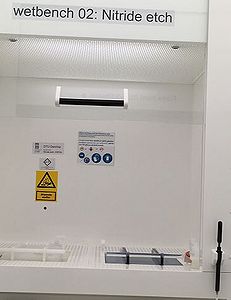Specific Process Knowledge/Etch/Wet Silicon Nitride Etch
Feedback to this page: click here
Unless anything else is stated, everything on this page, text and pictures are made by DTU Nanolab.
All links to Kemibrug (SDS) and Labmanager Including APV requires login.
All measurements on this page has been made by Nanolab staff.
Wet Etching of silicon nitride - stoichiometric and Si-rich - is done in a dedicated wetbench with an integrated quartz tank. The quartz tank can take up to 25 6" wafers in dedicated carriers. The 'Wetbench 02: Nitride etch' is placed in cleanroom D-3. The process is mainly used to strip silicon nitride (maskless), but can also be used for masked etching of silicon nitride using some kind of silicon oxide as etch mask. However, the wet silicon nitride etch is isotropic - meaning that the under-etching (etch-bias) at least amounts to the thickness of the silicon nitride layer.
The etch solution is initially 85 wt% H3PO4 which is heated up to the boiling temperature - ca. 160°C.
NB: Great care has to be taken in this process due to risk of bumping. Therefore it is essential, that you stir thoroughly during heat up, before you start heating, at 50°C, 80°C and finally at 100°C
The user manual, user APV and contact information can be found in LabManager:
Nitride etch info page in LabManager,
Wet Silicon Nitride Etch
| Nitride Etch @ 160oC | |
|---|---|
| Generel description | Etch/strip of silicon nitride |
| Link to safety APV and SDS | see APV here |
| Chemical solution | H3PO4 (85 wt%) |
| Process temperature | 160 oC |
| Possible masking materials |
|
| Etch rate |
|
| Selectivity RSi3N4 / RSiO2 | The selectivity (sirich nitride:oxide) is higher at 160 oC than at 180 oC |
| Batch size |
1-25 wafer at a time |
| Size of substrate |
2-6" wafers |
| Allowed materials |
|
